Credit Risk and Ratings Initiative
The ESG in Credit Risk and Ratings Initiative aims to enhance the transparent and systematic integration of ESG factors in credit risk analysis.
The PRI is facilitating a dialogue between credit ratings agencies (CRAs) and investors to cultivate a common language, discuss ESG risks to creditworthiness and bridge disconnects.
The initiative kicked off with the launch of the Statement on ESG in Credit Risk and Ratings, still open to signatories and so far supported by around 180 investors with over $40 trillion of AUM, and 25 CRAs. Four reports have been published as part of the initiative and over 20 forums organised around the world for credit practitioners.
Thanks to the PRI's advisory committee for its support. Contact us if you have any questions.

Statement on ESG in credit risk and ratings (available in different languages)
Latest resources
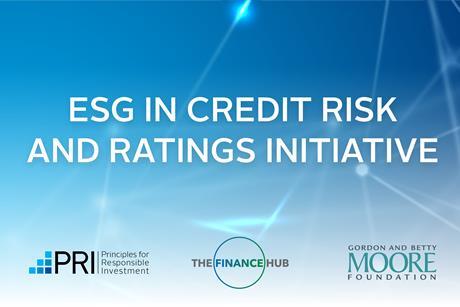
ESG in Credit Risk and Ratings initiative - phase two: Watch the video
The PRI’s ESG in Credit Risk and Ratings initiative promotes the systematic and transparent incorporation of ESG factors in credit risk assessments. Launched in 2016, the initiative is currently supported by more than 180 investors and 28 credit rating agencies.

ESG, credit risk and ratings: part 4 - deepening the dialogue between investors, issuers, and CRAs
The second phase of the ESG in Credit Risk and Ratings Initiative, which this report summarises, has deepened the dialogue that the PRI started between investors and credit rating agencies (CRAs) in phase one. It has also broadened the outreach to other stakeholders – primarily borrowers, but also ESG information .
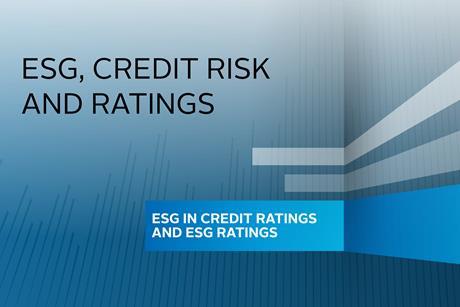
ESG in credit ratings and ESG ratings
Credit ratings and ESG ratings are distinct but complementary products. This page aims at providing clarity on the difference between the two, as well as the current offering landscape.
More resources
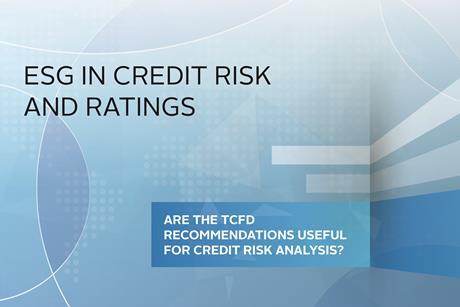
Are the TCFD recommendations useful for credit risk analysis?
Read about how investors and credit rating agencies use the information provided by companies following the recommendations of the Taskforce on Climate-related Financial Disclosures in their credit risk analysis.

ESG in credit risk: workshop series
The PRI’s ESG in credit risk and ratings initiative brought, for the first time, voices from the corporate side into the conversation on how to better incorporate ESG factors into credit analysis.
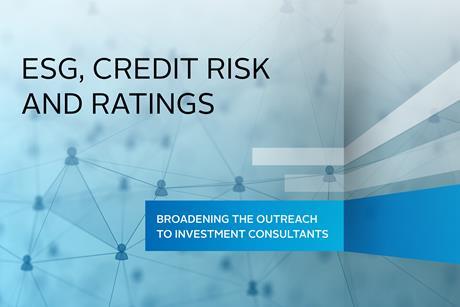
Broadening the outreach to investment consultants
Investment consultants are critical stakeholders in the investment chain, advising institutional asset owners on a range of issues, including the selection, appointment and monitoring of external managers.
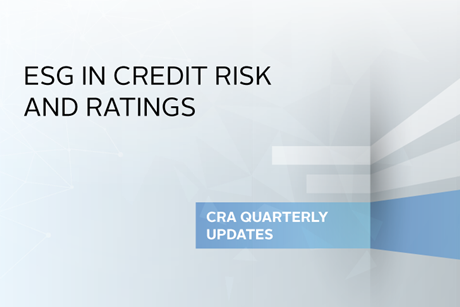
Credit Rating Agency (CRA) quarterly updates
To see the progress CRAs are making to enhance the integration of ESG factors in credit risk analysis, in keeping with their commitment to the above Statement, check the PRI’s quarterly updates.
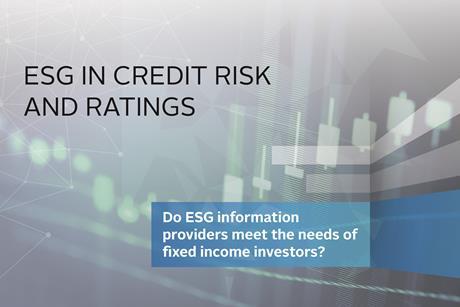
Do ESG information providers meet the needs of fixed income investors?
Read the conclusions of our discussion with 20 ESG information providers on how useful their data and product offerings are for fixed income investors and where they need to improve.
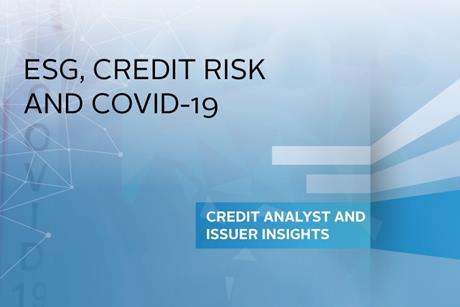
ESG, credit risk and COVID-19
Issuers’ crisis preparations and responses, and bondholder engagement, are two key areas of focus when considering the credit implications of the COVID-19 pandemic through an environmental, social and governance (ESG) lens.
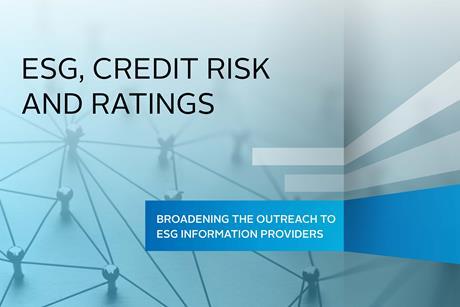
Broadening the outreach to ESG information providers
As well as continuing to engage with CRAs, the results from this survey will inform future discussions with ESG information providers, to help fixed income investors to best use available tools and analysis for ESG integration in their investment decisions.
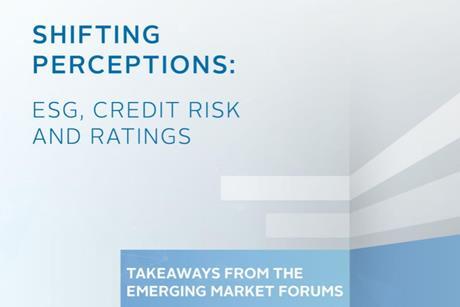
Takeaways from the EM forums
The emerging market forums completed the global series that gathered credit practitioners from investors and CRAs to discuss ESG topics.
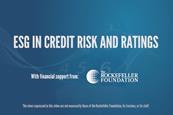
ESG in Credit Risk and Ratings initiative - phase one: Watch the video
The PRI’s ESG in Credit Risk and Ratings initiative promotes the systematic and transparent incorporation of ESG factors in credit risk assessments. Launched in 2016, the project is the first of its kind because of its credit focus and scale, with 21 forums held in 15 countries.

ESG in Credit Risk and Ratings initiative - phase two: Watch the video
The PRI’s ESG in Credit Risk and Ratings initiative promotes the systematic and transparent incorporation of ESG factors in credit risk assessments. Launched in 2016, the initiative is currently supported by more than 180 investors and 28 credit rating agencies.
Shifting perceptions series
ESG, credit risk and ratings: part 1 - the state of play
Investors and credit rating agencies (CRAs) are ramping up efforts to consider environmental, social and governance (ESG) factors in credit risk analysis.
ESG, credit risk and ratings: part 2 - exploring the disconnects
Credit practitioners from investors and credit rating agencies (CRAs) are uniting to discuss environmental, social and governance (ESG) topics.
ESG, credit risk and ratings: part 3 - from disconnects to action areas
The PRI examines action areas to consider transparently and systematically ESG factors in credit risk analysis, with active participants to the ESG in Credit Risk and Ratings Initiative, including Fitch Ratings, RAM Ratings, AXA, HSBC Global AM, Legal & General IM and Nomura AM. This webinar recording merges two sessions.
ESG, credit risk and ratings: part 4 - deepening the dialogue between investors, issuers, and CRAs
The second phase of the ESG in Credit Risk and Ratings Initiative, which this report summarises, has deepened the dialogue that the PRI started between investors and credit rating agencies (CRAs) in phase one. It has also broadened the outreach to other stakeholders – primarily borrowers, but also ESG information .
Webinars

PRI in Person & Online: Breakout 5D - Choosing credit-relevant time horizons
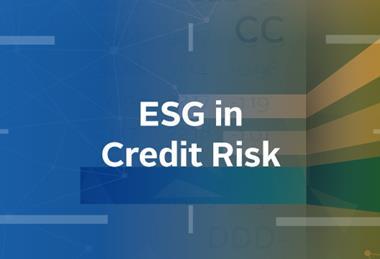
ESG in credit risk and ratings: Modelling uncertainty in credit risk

ESG in credit risk and ratings: broadening the outreach to investment consultants
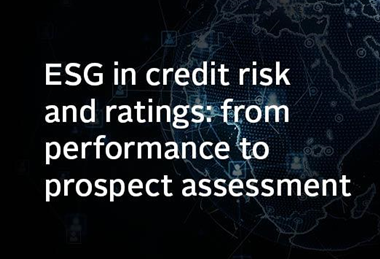
ESG in credit risk and ratings: from performance to prospect assessment

Do ESG information providers meet the needs of fixed income investors?

Social factors as a credit risk: the example of the pharmaceutical industry
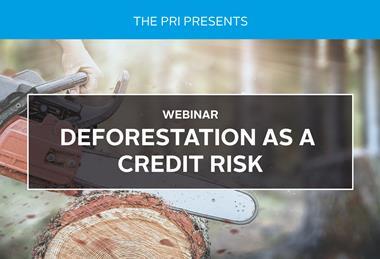
Deforestation as a credit risk
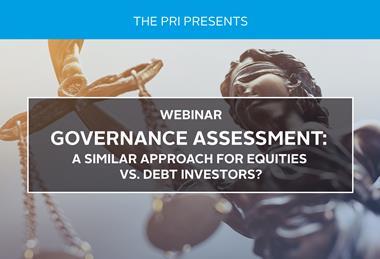
Governance assessment: a similar approach for equities vs. debt investors?
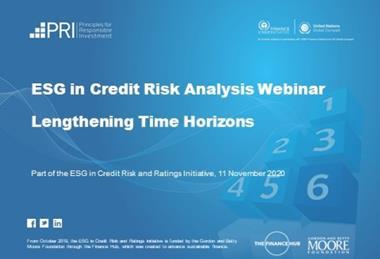
ESG in credit risk analysis: lengthening time horizons
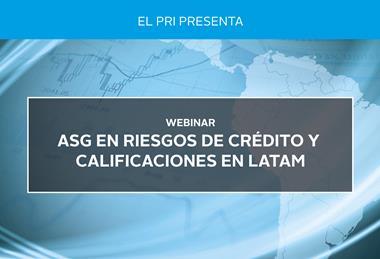
ASG en riesgos de crédito y calificaciones en LatAm
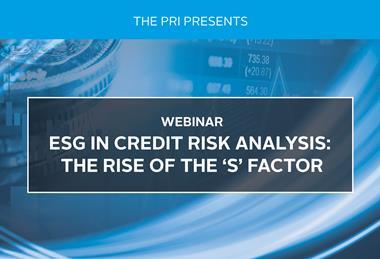
ESG in credit risk analysis: the rise of the ‘S’ factor
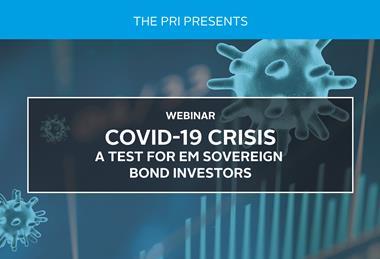
COVID-19 crisis: a test for EM sovereign bond investors
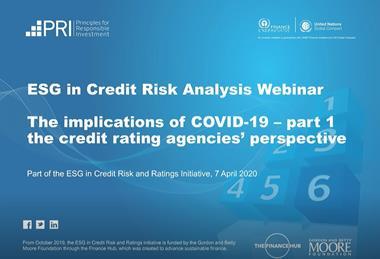
ESG in credit risk analysis: the implications of COVID-19 - part 1
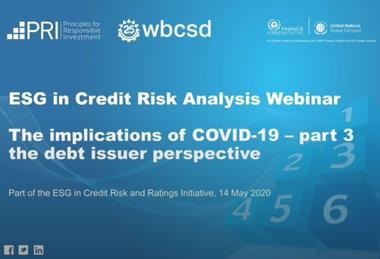
ESG in credit risk analysis: the implications of COVID-19 – part 3
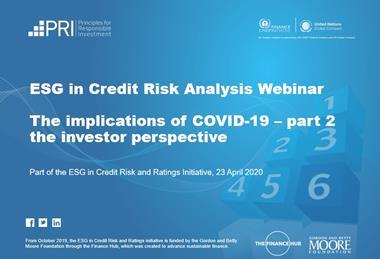
ESG in credit risk analysis: the implications of COVID-19 – part 2
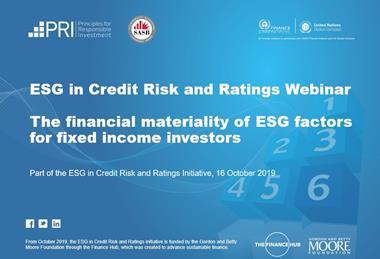
The financial materiality of ESG factors for fixed income investors
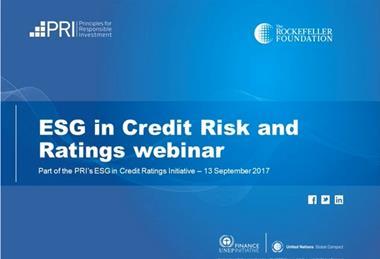
ESG in credit risk and ratings: part 1 - the state of play
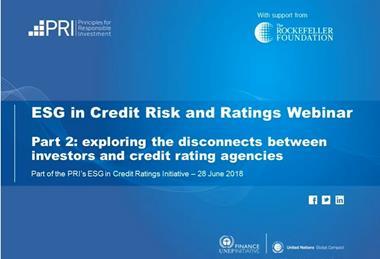
ESG in credit risk analysis: part 2 - exploring the disconnects
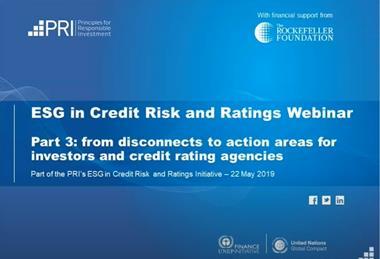
ESG, credit risk and ratings: part 3 - from disconnects to action areas
Podcasts
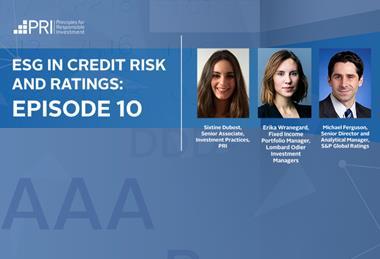
ESG in credit risk and ratings: episode 10
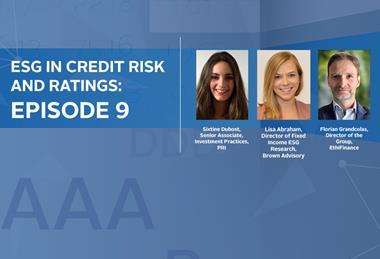
ESG in credit risk and ratings: episode 9
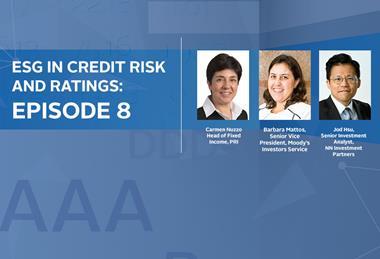
ESG in credit risk and ratings: episode 8
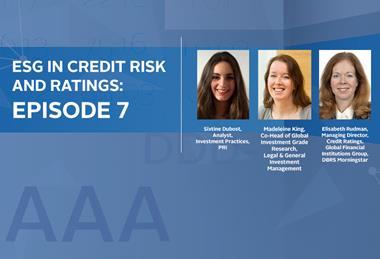
ESG in credit risk and ratings: episode 7
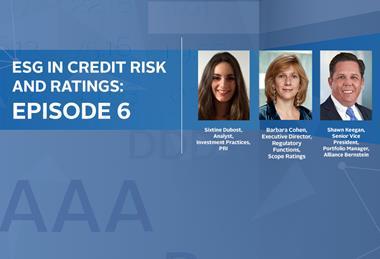
ESG in credit risk and ratings: episode 6
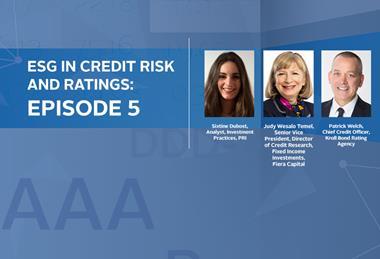
ESG in credit risk and ratings: episode 5
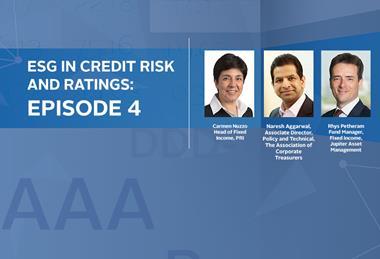
ESG in credit risk and ratings: episode 4
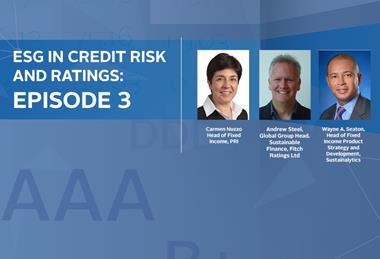
ESG in credit risk and ratings: episode 3
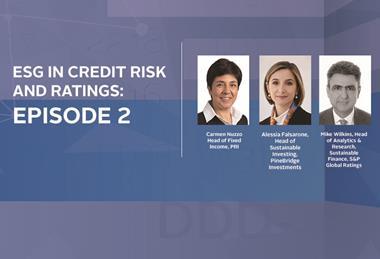
ESG in credit risk and ratings: episode 2
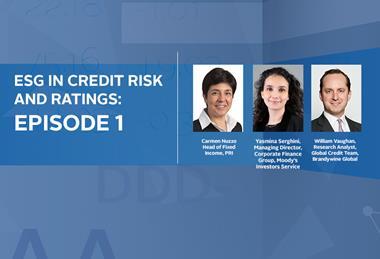
ESG in credit risk and ratings: episode 1
Investor and CRA case studies
Credit risk case study: Templeton Global Macro
Credit risk case study: PIMCO
Credit risk case study: Insight Investment
Credit risk case study: Colchester Global Investors
Credit risk case study: Caisse des Depots
Credit risk case study: Aegon Asset Management
Credit risk case study: Triodos Investment Management
Credit risk case study: Nomura Asset Management
Credit risk case study: NN Investment Partners
Credit risk case study: Nikko Asset Management
Credit risk case study: Legal & General Investment Management
Credit risk case study: HSBC Global Asset Management
Credit risk case study: Futuregrowth Asset Management
Credit risk case study: BlueBay Asset Management LLP
Credit risk case study: AXA Group
How ESG factors are becoming more explicit in credit rating agency commentaries
Credit risk case study: Coca Cola Amatil
ESG in credit risk and ratings forums
To address some of the disconnects between investors and CRAs that emerged at the start of the initiative, the PRI organised roundtables across the globe aimed at credit risk analysts, fixed income portfolio managers and strategists (ESG analysts were welcome if accompanying their colleagues). CRA representatives participated to explain how they incorporate ESG factors in their credit ratings and answered questions.
- Berlin (PRI in Person – panel session: ESG in sovereign credit risk)
- The Hague (hosted by Aegon Asset Management)
- Toronto (hosted by University of Toronto Asset Management)
- Montreal (hosted by PSP Investments)
- New York (hosted by Neuberger Berman)
- London (hosted by Insight Investment)
- Stockholm (hosted by Öhman)
- Paris (hosted by AXA)
- Frankfurt (hosted by Deutsche Börse)
- San Francisco (panel session hosted by Wells Fargo Asset Management) - video recording
- Sydney (hosted by the Financial Services Council)
- Tokyo (hosted by Nikko AM)
- Singapore (hosted by Eastspring Investments)
- Hong Kong (hosted by HKIFA)
- Cape Town (hosted by Investec)
- San Francisco (PRI in Person – panel session: assessing ESG risks through credit ratings and sustainability scores - audio recording)
- São Paulo (hosted by Itaú Asset Management)
- Santiago (hosted by Moneda Asset Management)
- Beijing (hosted by the Asian Infrastructure Investment Bank)
- Mexico City (hosted by Compass Group)
- Paris (PRI in Person – panel session: from disconnects to action – audio recording)
The initiative is funded by the Gordon and Betty Moore Foundation through The Finance Hub.


- About the PRI
- News and press
- Annual Report
- PRI governance
- Support us
- Careers
- Contact us
- Modern Slavery Statement
- Collaboration Platform
- Data Portal
- Reporting Tool
- Privacy policy
- PRI Academy
- The PRI is an investor initiative in partnership with UNEP Finance Initiative and UN Global Compact.
- PRI Association, 25 Camperdown Street, London, E1 8DZ, UK
- Company no: 7207947
- +44 (0)20 3714 3141
- [email protected]
- PRI DISCLAIMER
The information contained on this website is meant for the purposes of information only and is not intended to be investment, legal, tax or other advice, nor is it intended to be relied upon in making an investment or other decision. All content is provided with the understanding that the authors and publishers are not providing advice on legal, economic, investment or other professional issues and services. PRI Association is not responsible for the content of websites and information resources that may be referenced. The access provided to these sites or the provision of such information resources does not constitute an endorsement by PRI Association of the information contained therein. PRI Association is not responsible for any errors or omissions, for any decision made or action taken based on information on this website or for any loss or damage arising from or caused by such decision or action. All information is provided “as-is” with no guarantee of completeness, accuracy or timeliness, or of the results obtained from the use of this information, and without warranty of any kind, expressed or implied.
Content authored by PRI Association
For content authored by PRI Association, except where expressly stated otherwise, the opinions, recommendations, findings, interpretations and conclusions expressed are those of PRI Association alone, and do not necessarily represent the views of any contributors or any signatories to the Principles for Responsible Investment (individually or as a whole). It should not be inferred that any other organisation referenced endorses or agrees with any conclusions set out. The inclusion of company examples does not in any way constitute an endorsement of these organisations by PRI Association or the signatories to the Principles for Responsible Investment. While we have endeavoured to ensure that information has been obtained from reliable and up-to-date sources, the changing nature of statistics, laws, rules and regulations may result in delays, omissions or inaccuracies in information.














































